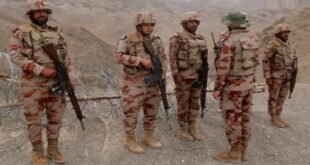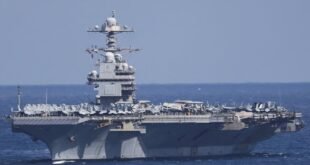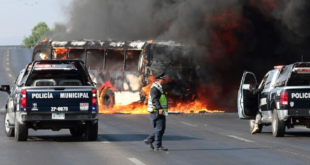25-02-2022
KYIV/ MOSCOW: Loud blasts were heard in the eastern Ukrainian city of Kharkiv on Friday, a witness told Reuters, as missile strikes and air raid alerts were reported in a number of cities in Ukraine.
An estimated 100,000 people fled as explosions and gunfire rocked major cities. Dozens have been reported killed. Russian troops seized the Chernobyl former nuclear power plant north of Kyiv as they advanced on the city from Belarus.
 Russia launched its invasion by land, air and sea on Thursday following a declaration of war by President Vladimir Putin. An estimated 100,000 people fled as explosions and gunfire rocked major cities. Dozens have been reported killed.
Russia launched its invasion by land, air and sea on Thursday following a declaration of war by President Vladimir Putin. An estimated 100,000 people fled as explosions and gunfire rocked major cities. Dozens have been reported killed.
America and Ukrainian officials say Russia aims to capture Kyiv and topple the government, which Putin regards as a puppet of the United States. Russian troops seized the Chernobyl former nuclear power plant north of Kyiv as they advanced along the shortest route to Kyiv from Belarus to the north.
Russia building up more troops in Belarus to assault Kyiv
Ukraine’s chiefs of staff said on Friday Russia was using the Gomel airfield in Belarus to line up troops to assault Kyiv due to damage to the Hostomel military airport near the Ukrainian capital.
“In order to intimidate the population of Ukraine, the enemy is increasingly choosing to destroy civilian infrastructure and housing,” the General Staff of the Armed Forces of Ukraine said in a Facebook statement.
A senior Ukrainian official said Russian forces would enter areas just outside the capital, Kyiv, later on Friday and that Ukrainian troops were defending positions on four fronts despite being outnumbered.
Russia has banned British airlines from landing at its airports or crossing its airspace, its state civil aviation regulator said on Friday.
The move follows London’s ban on the flights of Russian flag carrier Aeroflot imposed in response to Russia’s invasion of Ukraine.
Sanctions build
A democratic nation of 44 million people, Ukraine voted for independence at the fall of the Soviet Union and has recently stepped up efforts to join the NATO military alliance and the European Union, aspirations that infuriate Moscow.
The United States, Britain, Japan, Canada, Australia and the EU unveiled more sanctions on Moscow on top of penalties earlier this week, including a move by Germany to halt an $11 billion gas pipeline from Russia.
EU Foreign Policy Chief, Josep Borrell described the bloc’s measures as “the harshest package of sanctions we have ever implemented”.
China came under pressure over its refusal to call Russia’s assault an invasion.
US President Joe Biden, speaking to reporters at the White House, said: “Any nation that countenances Russia’s naked aggression against Ukraine will be stained by association.” He declined to comment directly on China’s position.
 Taiwan will join “democratic countries” in putting sanctions on Russia over the invasion of Ukraine, the government said on Friday, with the world’s largest contract chipmaker TMSC adding it would comply with all export control rules.
Taiwan will join “democratic countries” in putting sanctions on Russia over the invasion of Ukraine, the government said on Friday, with the world’s largest contract chipmaker TMSC adding it would comply with all export control rules.
Russia is one of the world’s biggest energy producers, and both it and Ukraine are among the top exporters of grain. War and sanctions will disrupt economies around the world.
Oil prices soared as much as $2 per barrel on Friday as markets brace for the impact of trade sanctions on major crude exporter Russia.
US wheat futures hit their highest in nearly 14 years, corn hovered near an eight-month peak and soybeans rebounded on fears of grain supply disruptions from the key Black Sea region.
Airlines were also facing disruptions, with Japan Airlines 9201.T cancelling its Thursday evening flight to Moscow and Britain closing its airspace to Russian carriers.
Russia’s economic defences likely to crumble over time under sanctions onslaught
Russia has spent the past seven years building up formidable financial defences, yet in the long run, its economy is unlikely to withstand the onslaught of coordinated sanctions from the West.
Europe and the United States are raining down reprisals after President Vladimir Putin sent tanks into Ukraine, adding to sanctions already pledged in response to his decision to recognize the independence of two breakaway Ukrainian provinces.
 “The view Russia will be unaffected is wrong. The negative effects may not be felt up front but sanctions will hobble Russia’s potential in the longer run,” said Christopher Granville, managing director at consultancy TS Lombard and a veteran Russia watcher.
“The view Russia will be unaffected is wrong. The negative effects may not be felt up front but sanctions will hobble Russia’s potential in the longer run,” said Christopher Granville, managing director at consultancy TS Lombard and a veteran Russia watcher.
Steps by the West include sanctions and asset freezes on more Russian banks and businessmen, a halt to fundraising abroad, the freezing of an $11 billion gas pipeline project to Germany and limiting access to high-tech items such as semiconductors.
Russia has dismissed sanctions as counter to the interests of those who imposed them. And they won’t immediately dent an economy with $643 billion in currency reserves and booming oil and gas revenues.
Those metrics have earned Russia the “fortress” economy moniker, alongside a current account surplus of 5% of annual GDP and a 20% debt-to-GDP ratio, among the lowest in the world. Just half of Russian liabilities are in dollars, down from 80% two decades ago.
Those statistics result from years of saving since sanctions imposed after Putin’s 2014 Crimea annexation.
 According to Granville, surging oil prices will offer Russia an extra 1.5 trillion Rouble ($17.2 billion) windfall this year from taxes on energy companies’ profits but this kind of autarky has a price, deepening isolation from the world economy, markets and investment, he noted.
According to Granville, surging oil prices will offer Russia an extra 1.5 trillion Rouble ($17.2 billion) windfall this year from taxes on energy companies’ profits but this kind of autarky has a price, deepening isolation from the world economy, markets and investment, he noted.
“Russia will essentially be treated as a hostile state cut off from global flows, investment and other normal economic interactions that build living standards, incomes, productivity and company profitability.”
Signs of economic vulnerability are already present. Russian household incomes are still below 2014 levels and in 2019, before the COVID-19 pandemic struck, annual economic output was valued at $1.66 trillion, according to the World Bank, far below the $2.2 trillion in 2013.
Sergei Guriev, economics professor at France’s Sciences Po and former European Bank for Reconstruction and Development chief economist, pointed out that Russian nominal per capita GDP, double China’s in 2013, was now behind.
“In 2013 Russia was a high-income country and was actively negotiating OECD accession. Russia is now back to the middle-income status,” he said. (Int’l Monitoring Desk)
 Pressmediaofindia
Pressmediaofindia





